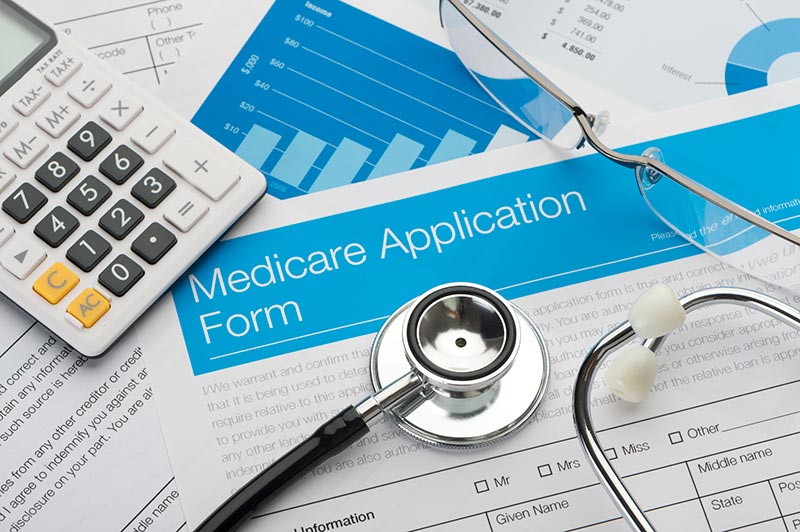FDIC-Insured - Backed by the full faith and credit of the U.S. Government
-
-

-
Barbara Rizvi, CFP®
Director, Financial Planning
Date Published: April 08, 2019
-
Article | Read time: 4 minutes

When planning for retirement, it’s important to think about how your regular living expenses may change. For example, if you’re planning to downsize to a less expensive home, your monthly mortgage may go down. An ongoing expense that all of us have and that shouldn’t be overlooked is the cost of healthcare. Whether this cost will be more or less expensive for you in retirement depends on many factors. Whether your golden years are a few years away or decades down the road, there are steps you can take to properly plan for your healthcare costs in retirement. In this blog we’ll review how you can estimate your healthcare expenses in retirement and how to plan accordingly.
When estimating your monthly healthcare expenditure in retirement, begin by looking at when you plan to retire and what will happen with your existing coverage when you do. For example, if you are retiring early you will need to plan for how you will pay for your health coverage before you are Medicare eligible at age 65. Lack of an employer-sponsored health plan is one of the key reasons people don’t retire early, so it’s important to talk to your financial advisor to see what options are best for you.
Next, determine how much you will be paying for Medicare and any supplemental coverage. There are multiple Medicare supplemental insurance plans to choose from and it’s important to make sure you will have the coverage you need. Understanding Medicare and determining which supplement plan is best for you can be overwhelming. Fortunately most states have Senior Health Information Programs (SHIP) available through the state’s department of insurance. These are free programs available to the public and can be readily found for your state by searching online. SHIP provides well-trained volunteers who can explain Medicare, supplemental insurance options and the associated costs.
Keep in mind that if your modified adjusted gross income is above a certain amount, you’ll also have to pay an Income Related Monthly Adjustment Amount (IRMAA), which is an additional amount added to your monthly Medicare Part B and Part D (prescription) premium. When determining if you will need to pay an IRMAA, Medicare looks at your modified adjusted gross income (MAGI) on your tax return from two years ago. For 2019, a married couple would have to pay IRMAA if their 2017 MAGI is in excess of $170,000 (or in excess of $85,000 if you are single) When estimating your monthly health expenses in retirement you also need to consider costs outside of what your Medicare plan will cover. Most Medicare plans don’t cover vision and dental, which is something you should add to your estimated out-of-pocket costs. Additionally, you should evaluate what you may pay out-of-pocket each month for things like medications, medical supplies and co-pays.
When you plan for retirement, it’s important to think about who will take care of you once you are no longer able to care for yourself. Some people have loved ones who are willing and able to care for them in their later years, while others will rely on assisted living or long-term care services. Regardless of your situation, you need to consider this when planning for retirement. If you are likely to need assisted living or nursing home care, long-term care insurance can help with the cost. Resources like Genworth's Cost of Care Survey can help you estimate the cost of long-term care services in your state and how the cost may increase each year. When it comes to long-term care insurance, it can be difficult to get coverage once you have health issues, so we encourage you to plan ahead and explore the cost and benefit of long-term care insurance as soon as your 50s.
If you’re still working and have a high-deductible health plan, your health savings account (HSA) can also help you pay for healthcare in retirement. Funds in an HSA are deposited pre-tax, grow tax-free and can roll over year after year. If you don’t need these funds for current health expenses, you can invest that money and let it grow over time until you need it in retirement. Because HSAs can roll over and the funds can be invested, you can get the most benefit out of them by making the maximum annual contribution.
Last but not least, living a healthy lifestyle is just as important as your financial plans. Never underestimate the power of staying active, eating well and maintaining a healthy weight. Living a healthy lifestyle now will pay dividends in retirement.
About the Author
Barbara is a Certified Financial Planner (CFP®) and Senior Financial Planner with the Private Client Advisory and Financial Planning teams at First National Bank Wealth Management. She specializes in providing comprehensive and personalized financial planning that incorporates investment, retirement, tax, protection and estate planning strategies
“FNBO Wealth” is a brand name that refers to First National Bank of Omaha (“FNBO”) and certain of its affiliates and subsidiaries that provide or make available trust, investment, securities brokerage, investment advisory, banking, and related services.
This material does not constitute legal, tax, accounting or other professional advice. Although it is intended to be accurate, neither the publisher nor any other party assumes liability for loss or damage due to reliance on this material.
